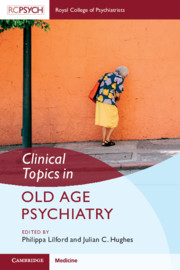Book contents
- Clinical Topics in Old Age Psychiatry
- ‘Clinical Topics In … ’
- Clinical Topics in Old Age Psychiatry
- Copyright page
- Dedication
- Contents
- Contributors
- Preface
- Acknowledgement
- Editors’ Note
- Abbreviations
- Introductory Comments
- Section 1 Epidemiology and Types of Disorders
- Section 2 Assessment and Investigations
- Section 3 Approaches to Management
- Chapter 14 Supporting Self-Management in Early Dementia
- Chapter 15 What Can Person-Centred Care in Dementia Learn from the Recovery Movement?
- Chapter 16 Psychosocial Interventions in Dementia
- Chapter 17 Palliative Care in Dementia
- Chapter 18 Review of Treatment for Late-Life Depression
- Chapter 19 Reducing the Healthcare Burden of Delirium
- Chapter 20 Controlling the Confusion
- Section 4 Law, Ethics, and Philosophy
- Index
- References
Chapter 14 - Supporting Self-Management in Early Dementia
A Contribution Towards ‘Living Well’?
from Section 3 - Approaches to Management
Published online by Cambridge University Press: 12 September 2020
- Clinical Topics in Old Age Psychiatry
- ‘Clinical Topics In … ’
- Clinical Topics in Old Age Psychiatry
- Copyright page
- Dedication
- Contents
- Contributors
- Preface
- Acknowledgement
- Editors’ Note
- Abbreviations
- Introductory Comments
- Section 1 Epidemiology and Types of Disorders
- Section 2 Assessment and Investigations
- Section 3 Approaches to Management
- Chapter 14 Supporting Self-Management in Early Dementia
- Chapter 15 What Can Person-Centred Care in Dementia Learn from the Recovery Movement?
- Chapter 16 Psychosocial Interventions in Dementia
- Chapter 17 Palliative Care in Dementia
- Chapter 18 Review of Treatment for Late-Life Depression
- Chapter 19 Reducing the Healthcare Burden of Delirium
- Chapter 20 Controlling the Confusion
- Section 4 Law, Ethics, and Philosophy
- Index
- References
Summary
Social and demographic changes and advances in acute medicine are leading to an ageing population. Many, perhaps most, people will now live for significant periods with long-term health conditions and illness. There are over one million people with dementia currently living in the UK, at an estimated annual cost of £26.3 billion to society with the average cost being £32,250 per person per year. The estimated breakdown of this cost is £4.3 billion spent on healthcare, £10.3 billion on social care (publicly and privately funded) and £11.6 billion contributed by the work of unpaid carers of people with dementia.
- Type
- Chapter
- Information
- Clinical Topics in Old Age Psychiatry , pp. 191 - 201Publisher: Cambridge University PressPrint publication year: 2020

